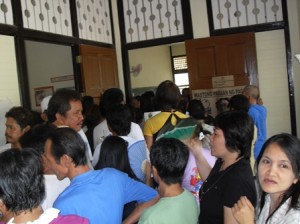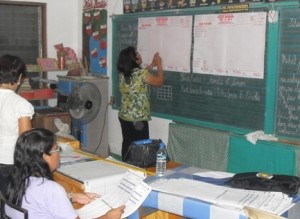by NINA TOMEN
Citizen Journalists-Pampanga
 SAN FERNANDO, Pampanga.—It was past midnight, hours after voting in Monday’s first automated elections had ended. But in many precincts here and elsewhere in the province, as well as the country, boards of elections inspectors (BEIs) were still busy sorting out the printed returns and sealing these before delivering these to the municipal offices of the Commission of Elections.
SAN FERNANDO, Pampanga.—It was past midnight, hours after voting in Monday’s first automated elections had ended. But in many precincts here and elsewhere in the province, as well as the country, boards of elections inspectors (BEIs) were still busy sorting out the printed returns and sealing these before delivering these to the municipal offices of the Commission of Elections.
It had been a long day for members of the BEIs who, like in past elections, had withstood hours of hunger and exhaustion. Administering the elections was certainly markedly different this year because of the bigger number of voters the election inspectors had had to serve as a result of precinct clustering. Where three-member BEIs each used to deal only with 200 voters, they had to manage triple the number in most instances.
But several BEI members admitted that conduct of this year’s elections was also made more difficult by the lack of proper orientation on automation.
Civil society electoral watchdogs noted that election inspectors were indeed not properly oriented on the voting procedures, including on the distribution of election returns to groups accredited by Comelec.
The Parish Pastoral Council for Responsible Voting (PPCRV), one of the three accredited citizens’ arms, was entitled to the fourth of the first eight copies of the returns and one of the 22 printed returns in the second batch. But the Church-based group here reported that some BEIs refused to give these copies to PPCRV representatives
In Batasan in Macabebe town, the PPCRV sent a team to monitor polling in the area amid reports that a man with more than one ballot was feeding these to the PCOS.
The Church-based group said its representative asked the man why he was doing that when it was supposed to be the BEI’s responsibility. Its representative also noted the presence of another man, later recognized as a barangay captain and brother of a mayoralty candidate, giving orders to the first man.
The PPCRV also found the ballot box in the precinct unlocked, to which the BEI replied it was because of the paper jam.
Chaos and frayed nerves marked the first few hours of voting in the province as people, jittery over the automated elections, trooped to the polling places and endured the sweltering summer heat in long queues that had them waiting in line and sweating for at least three hours.
Malfunctioning precint count optical scan (PCOS) machines worsened the situation in some Pampanga towns and caused delays in the casting of votes. A good number of voters gave up after failing to locate their names in the Certified Voters’ List. There were also spoiled ballots, but the PPCRV said it was minimal.
By 2 p.m., at least half of the registered voters were able to cast their votes after the Comelec allowed more voters inside the polling places, extended voting by an hour and permitted election inspectors to cast their votes in their respective polling assignments.
In Lubao town where President Gloria Arroyo cast her vote during the first hour of voting after hearing mass at the San Agustin Church beside her mansion, voting was generally peaceful.
 The problem was the lack of PPCRV volunteers in Lubao. As a result, poll watchers of the administration party Lakas-Kampi-CMD took upon themselves to help voters, from locating their names in the certified voters’ list to organizing the queues to shading the ballots for senior citizens who were given priority at polling precincts nationwide.
The problem was the lack of PPCRV volunteers in Lubao. As a result, poll watchers of the administration party Lakas-Kampi-CMD took upon themselves to help voters, from locating their names in the certified voters’ list to organizing the queues to shading the ballots for senior citizens who were given priority at polling precincts nationwide.
When voting ended, random manual audit was performed in four precincts precint in Lubao—Sta. Cruz (Precinct 72), Palcarangan (Precinct 54), San Francisco (Precinct 34), Sta. Monica (Precinct 84)— and a precinct in Porac (Precinct 27 in Mancatian).
